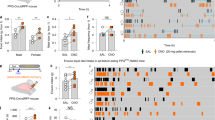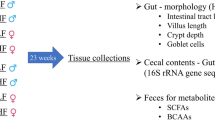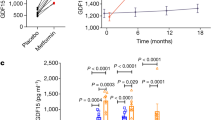Abstract
Arising from: R. L. Batterham et al. Nature 418, 650–654 (2002); Batterham et al. reply
Batterham et al. report that the gut peptide hormone PYY3–36 decreases food intake and body-weight gain in rodents1, a discovery that has been heralded as potentially offering a new therapy for obesity. However, we have been unable to replicate their results. Although the reasons for this discrepancy remain undetermined, an effective anti-obesity drug ultimately must produce its effects across a range of situations. The fact that the findings of Batterham et al.1 cannot easily be replicated calls into question the potential value of an anti-obesity approach that is based on administration of PYY3–36.
This is a preview of subscription content, access via your institution
Access options
Subscribe to this journal
Receive 51 print issues and online access
$199.00 per year
only $3.90 per issue
Buy this article
- Purchase on Springer Link
- Instant access to full article PDF
Prices may be subject to local taxes which are calculated during checkout

Similar content being viewed by others
References
Batterham, R. L. et al. Nature 418, 650–654 (2002).
Halford J. C. et al. Pharmacol. Biochem. Behav. 61, 159–168 (1998).
Kanatani, A. et al. Endocrinology 141, 1011–1016 (2000).
Allen, J. M. et al. Digestion 30, 255–262 (1984).
Amersham Biosciences, RPNQ0085, Neuropeptide Y SPA binding assay (Y2).
Halatchev, I. G. et al. Endocrinology 145, 2585–2590 (2004).
Challis, B. G. et al. Biochem. Biophys. Res. Commun. 311, 915–919 (2003).
Challis, B. G. et al. Proc. Natl Acad. Sci. USA 101, 4695–4700 (2004).
Asakawa, A. et al. Gastroenterology 124, 1325–1336 (2003).
Nordheim, U. & Hofbauer, K. G. Am. J. Physiol. Regul. Integr. Comp. Physiol. 286, R138–R142 (2004).
Author information
Authors and Affiliations
Corresponding author
Ethics declarations
Competing interests
Several of the authors consult with, and have received financial support from, companies and institutions, including pharmaceutical firms, that may have active programmes relating to PYY3–36 of which we are not aware. Several of these companies have obesity-treatment development programmes and may therefore, from some perspectives, be considered competitors to companies pursuing PYY3–36.
Rights and permissions
About this article
Cite this article
Tschöp, M., Castañeda, T., Joost, H. et al. Does gut hormone PYY3–36 decrease food intake in rodents?. Nature 430, 1–3 (2004). https://doi.org/10.1038/nature02665
Published:
Issue Date:
DOI: https://doi.org/10.1038/nature02665
This article is cited by
-
The timing of fasting leads to different levels of food consumption and PYY3–36 in nocturnal mice
Hormones (2020)
-
The effect of breakfast with different macronutrient composition on PYY, ghrelin, and ad libitum intake 4 h after breakfast in Indonesian obese women
BMC Research Notes (2018)
-
Mass spectrometry-assisted confirmation of the inability of dipeptidyl peptidase-4 to cleave goldfish peptide YY(1–36) and the lack of anorexigenic effects of peptide YY(3–36) in goldfish (Carassius auratus)
Fish Physiology and Biochemistry (2016)
-
Gut fat signaling and appetite control with special emphasis on the effect of thylakoids from spinach on eating behavior
International Journal of Obesity (2015)
-
Short-term aerobic exercise training increases postprandial pancreatic polypeptide but not peptide YY concentrations in obese individuals
International Journal of Obesity (2014)
Comments
By submitting a comment you agree to abide by our Terms and Community Guidelines. If you find something abusive or that does not comply with our terms or guidelines please flag it as inappropriate.



